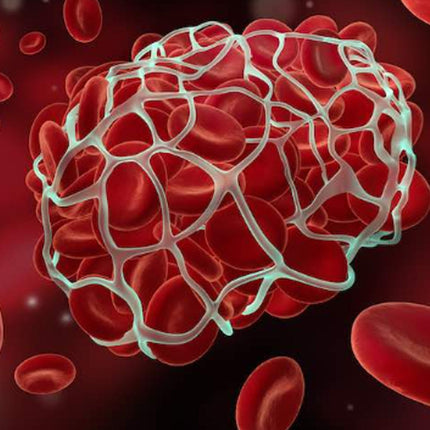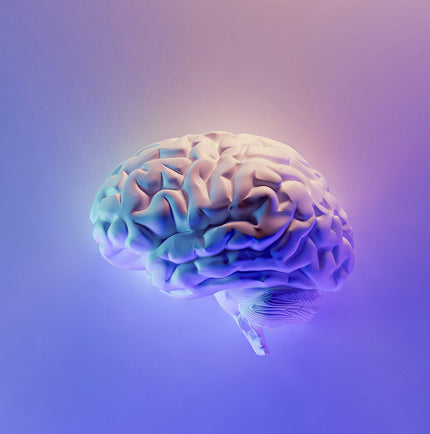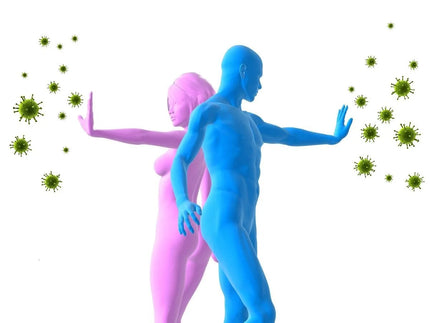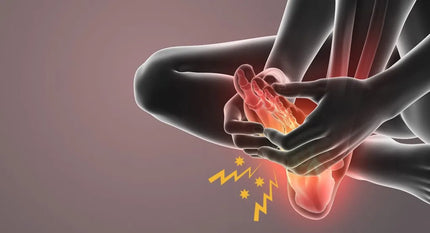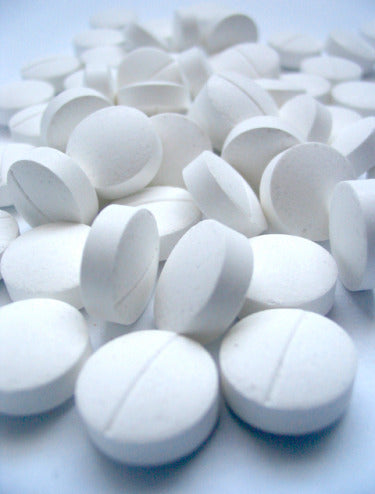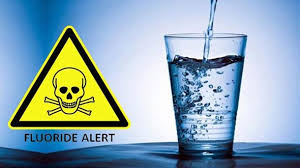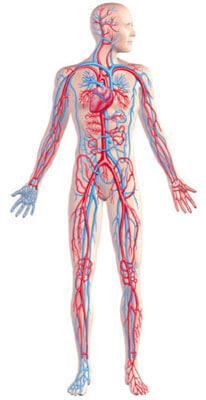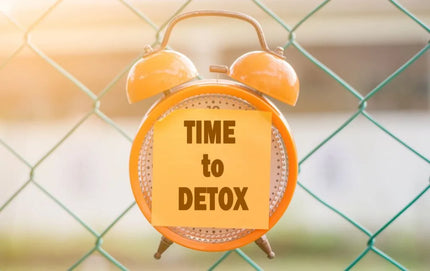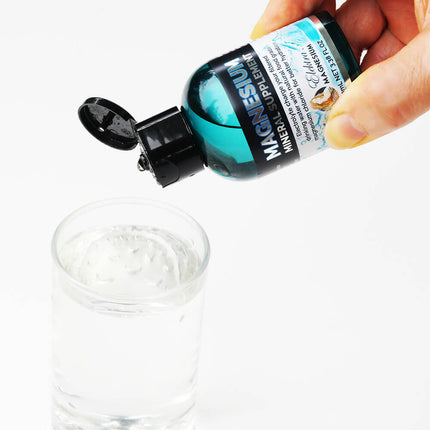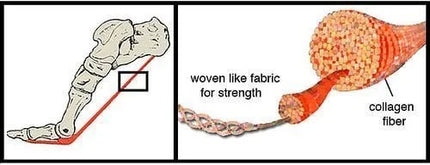Tax included and shipping calculated at checkout
If you are one of the one percent in the world that has discovered with horror that white patches are appearing on your skin, hair or oral cavity, where the melanin (our skin’s tan colour pigment) has been lost, this information may be just what you are looking for.
I was able to stop the progression of vitiligo in its tracks with some simple lifestyle changes and plenty of magnesium nutrition. I am happy to say that, with daily transdermal magnesium, in more than ten years later the vitiligo patches have not progressed any further.
Can vitiligo be reversed?
Reports from some people are that vitiligo can be reversed, but only in certain circumstances and more likely in younger age groups. If the melanocytes do regenerate, they start at the outer edges of the patches and move inwards towards the centre of the patch. This process can take several months. Scientists can’t yet explain why it works with some and not others, but more research is underway.
As for me, I was over 50 when menopause set in, accompanied by an autoimmune disorder called Hashimotos Hypothyroidism, severe heart arrhythmia, and the emerging white patches on my skin. This form of autoimmune hypothyroidism is thought to be prevalent in about 5% of the world’s population, however I believe the numbers are growing as people become more chemically sensitive to pollutants that stress the thyroid.
I had suffered chronic magnesium deficiency for many years before I finally discovered the problem and was able to fix it. I think that it was my age group that made it more difficult for me to re-generate new melanocytes to reverse the vitiligo patches.
But hey, I don’t really care because I feel great now, and have my energy levels back with a calm heart. I also sleep better and maintain a strong immune system. I feel so much more able to cope with the stresses of life. I just use a bit of mineral makeup on the facial patches, and don’t really worry about those on arms and legs. I’m just thankful that the patches stopped advancing and that I am living life more fully and enjoyably again.
Where do vitiligo patches appear?
Vitiligo patches tend to appear mostly on areas of the body that have had some kind of damage in the past, or an irritation like the rubbing of the top of shoes on feet, or like repetitive rubbing of the underside of forearms on table tops! If you have had acne or sunburn, even if skin has healed up and is intact, the vitiligo patches can appear right there later on, like ghosts from the past.
Be careful with those white patches when you go out in the sun because they don’t have the protection of melanin, which absorbs UV radiation. The white patches are more prone to sun damage.
What causes vitiligo?
Whilst the vitiligo isn’t itself an imminent threat to life, it is usually connected with progression of some kind of other disease state. Scientists have found a strong association between the onset of vitiligo and various autoimmune diseases, including hypothyroidism, multiple sclerosis, rheumatoid arthritis, idiopathic thrombocytonpenic purpura, seronegative arthritis, pernicious anemia, myasthenia gravis, inflammatory bowel disease, lymphoma, and systemic lupus erythematosus. (Hadi, Wang et al. 2020)
Research shows that vitiligo is likely to be hereditary, but it finds expression when excessive stress triggers it. So even though you may have the set of genes that makes you pre-disposed to get vitiligo, it may not appear unless stress levels and nutritional deficiencies become great enough.
Therein lies the fix! Just be mindful of excessive stress, adopting a lifestyle which can avoid it, AND make sure to compensate with plenty of magnesium daily to make sure you don’t become magnesium deficient. I will explain more about this later.
The fire of inflammation in Hashimotos – an immune system cytokine storm
I was very keen to find out how my condition of Hashimotos hypothyroidism (autoimmune thyroiditis) could cause my vitiligo, and so started combing the scientific literature. A systemic review and meta-analysis found that vitiligo patients have significantly elevated IL-17 (Interleukin-17) levels. (Acharya and Mathur 2020). IL-17 and TNF (Tumor Necrosis Factor) are pro-inflammatory cytokines which have been implicated in various skin diseases, including psoriasis and vitiligo. They are biomarkers for a heightened inflammatory process involving mononuclear lymphocytes.
Lymphocytes are the white blood cells of our immune system sent in to wage war on pathogens (non-beneficial viruses and bacteria) by using hydrogen peroxide. Yes, it’s like hair bleach. In the case of vitiligo, T helper-17 cells produce Interleukin-17, which signals and triggers these killer lymphocytes (T cells) to kill infected cells. (Baldini, Odorisio et al. 2017)
Afterwards the phagocytes come to clean up the dead bodies and debris. To maintain balance so that these ‘soldier’ T cell lymphocytes don’t get carried away with the destruction, regulatory T cells (Treg) are supposed to be dispatched to inhibit the lymphocytes and restore peace.
How is it then, that something has gone wrong with the balancing system in Hashimotos hypothyroidism so that the immune system is let loose to attack the thyroid as well as melanocyte cells of the skin, causing melanocyte apoptosis (cell death)? Why do the T cell lymphocytes kill more than just diseased cells? Scientists have noted that in vitiligo, there is also a reduction in the Treg cells that inhibit T cell lymphocytes. (Baldini, Odorisio et al. 2017). But there are more clues to solving this puzzle.
What has autoimmune dysfunction got to do with digestion?
I don’t believe that the body necessarily wants to attack its thyroid or its melanocyte cells in autoimmune dysfunction, as is commonly touted. I do believe that the body’s systems are always programmed and pitched towards life and survival. Your body desperately wants you to live and survive well. It uses everything in its arsenal to defend, to detox and to repair and re-build cells. Nature, all life on the planet, wants to live and thrive. Why would your body be any different?
Your body is programmed for maintaining life and is always employing compensating mechanisms if something moves out of balance. When disease symptoms appear, it’s a sign that the body has not been able to employ the right amount of compensation because some kind of nutrition or environmental conditions are missing.
Iron deficiency anaemia is often a precursor symptom of hypothyroidism, or as a result of it, because digestion is failing to extract sufficient iron from the diet. (Cellini, Santaguida et al. 2017). Even if you were getting enough iron, you need sufficient B12, vitamin C and magnesium to help utilise that iron, and these nutrients are also likely to be deficient due to digestion problems.
If you don’t get the right nutrients to produce enough stomach acid this condition is called hypochlorhydria. The lower stomach acid makes it harder to digest and extract B group vitamins and minerals from protein foods, including B12, iron, folate, magnesium, zinc and selenium. And guess what the stomach needs to do its job? Magnesium chloride, sodium, zinc, selenium, iodine, B group vitamins and vitamin K. It’s a Catch-22 situation.
Interestingly, the thyroid uses these same nutrients to produce thyroid hormone T4 and convert to active form T3, and we need sufficient magnesium to absorb and use thyroid hormone. It’s the magnesium that drives the enzyme activity and hormone production in the body. Hormones and enzymes are proteins that are magnesium-dependent. As magnesium levels drop, metabolism drops, which means our electrical system becomes weaker and has to ration resources (like on computer ‘safe mode’).
The other issue caused by hypochlorhydria is that there is not enough stomach acid to kill bad bacteria such as Heliobacter pylori, which, if colonies overgrow, can cause dyspepsia symptoms, as well as ROS free radicals that can eat holes in your gut lining, causing leaky gut symptoms. Chronic constipation is also a common side effect with complications in the gut microbiome.
If foods are not fully digested by the stomach and get into the small intestine it can cause SIBO – Small Intestinal Bacterial Overgrowth, which produces a lot of painful gas.
Hypochlorhydria can result in a perfect storm of underperforming thyroid and lower metabolism, combined with diet not providing enough vitamins and minerals for hydrochloric acid in the stomach to extract all the nutrients. It can turn into a revolving door of hypothyroidism and hypochlorhydria causing mal-digestion and mal-absorption of nutrients, which causes more thyroid depression, which leads to more digestive disorders, and so on down the cascade. Add to that excessive stress, and it speeds up the whole degrading process.
The thyroid actually develops from the primitive gut and both organs share the same endothermal origin. An Italian study confirmed, “Thyroid follicular and the stomach’s parietal cells are both polarized and characterized by the presence of apical microvilli housing enzymatic activities. Furthermore, gastric mucosal and thyroid follicular cells both show the ability to concentrate and transport iodine across the cell membrane.” (Cellini, Santaguida et al. 2017).
The thyroid, stomach and gut lining functions also involve similar enzymes and efficient peroxidase activity. They are part of the vagus nerve of the endocannabinoid system, which is the brain-gut connection. If this system goes out of kilter, it can affect your moods and cause depression and anxiety. It is also sensitive to estrogenic chemicals – especially synthetic ones like The Pill, which can deplete magnesium and cause nervous system disorders, muscle twitches and cramping, as well as emotional fragility.

Helping digestion
This is why it is so important to eat a balanced organic diet, which provides the full spectrum of nutrients. It doesn’t however guarantee that you will digest or absorb all you need. You can add extra digestive enzymes to your meal to help the digestive process along. This could be in the form of capsules with bromelain, papain or other similar vegetable enzymes. You could also eat some fermented vegetables like sauerkraut or kim chi with your meals if your stomach isn’t too sensitive.
Another great dietary rule is proper food combining so that you don’t load up the stomach too much with foods that fight each other. For instance, starches like potatoes, pasta, bread or other grain foods should not be consumed together with meats or other heavy proteins in the same meal because the heavy protein takes longer to digest – especially if not enough digestive enzymes or stomach acid is available! This means the starches can start to bubble with trouble in the stomach, producing painful smelly gas, as well as acid reflux of the oesophagus. Eat your heavy proteins together with light salad or watery type vegetables for easier digestion.
Beware of popping antacid tablets because they suppress stomach acid which you need for digestion. The gastric reflux problem is usually because there is not enough stomach acid to digest food which consequently stays in the stomach too long. In the case of gastric reflux between meals (when not digesting food), I found it much more helpful to have a level teaspoon of bicarbonate of soda in a glass of water, which neutralises acids that may be caused by stomach bacteria, or bacteria from SIBO. It also helps to line the stomach and gut for protection.
People with this type of genetic profile have a better outcome by staying on a paleo-type diet with main focus on vegetables. Add a small amount of fermented foods to your meals. If you eat meats, cook well till they are very soft, such as in soups. Don’t skimp on your good fats (cold, not super-heated and no margarine), because they support cell membranes and also the endothelial linings of the digestive system and vascular network. Avoid sugars and sweet things because they steal your magnesium and upset metabolism. If you have to indulge in something, a little honey is a healthy alternative, as are forest berries.
Eat slowly, mindfully and not a lot at one time so that you don’t feel too ‘full’. Never woof your food down like your pooch might do. Every morsel needs to be appreciated for better digestion. It also helps not to eat whilst stressed. If you eat together with others and someone starts to talk about problems at the table, ask them politely to stop and to postpone the discussion for another time. Stress is one of the worst enemies of digestion.
You can also absorb a lot of magnesium transdermally via magnesium bathing, as well as topical magnesium cream, lotion or oil. Transdermal absorption bypasses the digestive system to deliver vital magnesium quickly to where it is needed. It is very relaxing. Just rub it into tense muscles and feel the difference within minutes!
"Cases of: Hypo-Thyroidism, Obesity, Slow Metabolism need your product, which will put them on right track. Even my Rheumatiod Arthritis cases are showing glowing results." Dr P D Gupta (www.tedcure.com)
Intermittent fasting also helps give your digestive system enough time to rest and recover. The 8-hour eating cycle has become very popular for this reason (and helps to keep off excessive weight). That is, have your meals within an 8-hour time frame and do not eat food for the rest of the 16 hours. A lot of people tend to combine a late breakfast with early lunch and then just have another meal in the early evening so that the eating cycle falls within the eight hours. But make sure to stay well hydrated with purified and mineralised water (preferably with magnesium). Beware of fluoridated tap water because fluoride not only binds up your magnesium, but it also blocks the thyroid and causes hypothyroidism.
Gilbert’s syndrome
Gilbert’s Syndrome is usually associated with an underperforming thyroid and a problem with liver enzymes. This is where the skin looks a bit yellowish because the oxidised heme protein is not broken down and cleared quickly enough by the liver’s enzymes. Remember that enzyme activity is dependent on magnesium, and magnesium deficiency can inhibit proper liver clearance of toxins and wastes.
If you have Gilbert’s Syndrome, it’s a good idea to take extra care of your liver via diet and to make sure you avoid chemical exposures (or excessive alcohol) which could overload the liver. Generally, Gilbert’s Syndrome is not life-threatening in and of itself, however it is connected with a more sensitive liver function. It coincides with digestive issues as outlined above and is a biomarker for propensity to develop hypothyroid or liver disease.
Gut microbiome, inflammation and free radical damage
There are several studies which show that our gut microbiome need a good supply of magnesium to function well. We need them to help digestion and absorption via the intestinal wall, to help peristalsis and elimination of wastes, to help maintain healthy villi of the intestinal lining, and to produce important vitamins such as B12. Beneficial bacteria also produce over 90% of our neurotransmitter hormones and help to dampen down inflammation in the body. We really can’t survive well without a healthy microbiome.
A study showed that a magnesium deficient diet alters the composition of the gut microbiome. Mice exposed to a magnesium deficient diet for six weeks were more immobile than control mice, suggesting an increased depressive-like behaviour. (Winther, Pyndt Jorgensen et al. 2015).
Magnesium has a marked effect on reduction of inflammation in the body. There is an inverse relationship with the level of magnesium reserves and the increase in inflammation. High magnesium levels are associated with reduced inflammation, and lower magnesium levels are associated with more acute inflammatory responses.
Studies have shown that free radical production from neutrophils is inhibited when high magnesium levels are present in the extracellular space. Magnesium was also found to inhibit superoxide in cultured human neutrophils. (Chandrasekaran, Weir et al. 2014). Interestingly, a synergistic inhibition of superoxides was also revealed with the addition of zinc ions to the magnesium solutions.
Superoxides are free radicals (acidic molecules) looking to steal electrons from your good cells, and thus able to do a lot of cell damage. They are produced as a result of mitochondrial metabolism, by-products from pathogenic bacteria and also stressful conditions. To counteract and neutralise the free radicals, we need more antioxidant support from nutrition, including vitamin C, B group vitamins, anthocyanins, zinc – and magnesium!
An important antioxidant enzyme that neutralises superoxides is superoxide dismutase – which is magnesium dependent. Glutathione is another powerful antioxidant enzyme that mops up toxic waste by-products and heavy metals. The thyroid needs a lot of it. And guess what? Glutathione is also magnesium dependent.
Stress causes excessive loss of magnesium reserves and the lower the magnesium gets, the higher the level of pro-inflammatory cytokines and free radicals which are not being controlled by the enzymes that dampen down inflammation. We become increasingly sensitive and less tolerant to stress the more magnesium drops.
Lack of sleep is a big stressor
It can become difficult to get a good night’s sleep because an inflammatory response causes a rise in adrenaline and cortisol stress hormones which prevent a deeper level of sleep. The pineal gland however needs deep sleep to make melatonin. Whilst your stress hormone levels are too high you can’t make the melatonin you need. Melatonin is a powerful antioxidant hormone that helps to detoxify the brain, which is why we feel so refreshed after a deep sleep.
Magnesium helps to dampen down the stress hormones to help you get into that deeper level of sleep, but it’s best to get to bed by 10pm, or latest 11pm, for higher quality sleep.
Melatonin receptors (MT1 and MT2) are known to be expressed in human epidermal melanocytes. Melatonin also promotes glutathione production, which serves as a first line of defence against oxidative damage. A study found that melatonin and its metabolites protect melanocytes from UVB-induced DNA damage and oxidative stress, and stimulate UVB-induced DNA repair. (Janjetovic, Jarrett et al. 2017).
As Reactive Oxygen Species (ROS) levels increase, cellular glutathione levels in melanocytes decrease. And remember that glutathione production depends on magnesium. Mitochondria are also very dependent on glutathione because they are major producers of ROS, which, if it gets out of control because of glutathione shortfall, excessive ROS can also lead to mitochondrial damage and death.
Mitochondria depend on magnesium in metabolism to make ATP (adenosine triphosphate), our electrical energy currency. Magnesium also controls calcium levels to protect membrane integrity. If calcium levels get too high because of magnesium deficiency, it can also lead to overstimulation, hardening and mitochondrial damage. The more stress hormones produced, the more calcium levels are pushed up, the more magnesium levels decrease. The see-saw also goes the other way. As you lift magnesium level, it controls the excessive aberrant calcium and dampens down the stress hormones, allowing you to relax and recover. (Seelig 1980)
The melanin and magnesium antioxidant defence system
Actually, every system in the body is like a see-saw – always looking to re-balance. The better it is at maintaining balance, the better our health and resilience. When your skin is exposed to UV radiation that stress and resulting ROS stimulate melanocytes to produce more melanin to repair DNA and also to absorb more UV radiation as a protective mechanism. A small amount of ROS stimulation (from sunlight) can thus be beneficial for the skin because it leads to production of melanin (a nice tan!). The caveat of course is that the ROS should be controlled and kept in check by melanin, which is dependent on antioxidants like melatonin and glutathione, which are both dependent on magnesium. If the amount of ROS produced overpowers your antioxidant defence system, you get into trouble.
It may surprise you that melanin is not only confined to the skin, but has been found in mitochondria and all cells, particularly in major organs, including the thyroid. If you are experiencing vitiligo, it is also conceivable that you are expressing melanin deficient cells elsewhere too. This is a sign your antioxidants are severely depleted and your body is not able to counteract the ROS free radicals that seek to dissolve you.
It’s not that your body is trying to attack you in Hashimotos (autoimmune) hypothyroidism, but rather its ‘see-saw’ has become out of balance due to a lack of nutritional antioxidant defences.
I was able to stop the advancement of Hashimotos, vitiligo and severe heart arrhythmia in its tracks over a six month period by heavy antioxidant support, including daily over 1,000mg of transdermal magnesium , 3 or 4 grams of vitamin C, B group executive formula (with significant B6), transdermal iodine on soles of feet for three days every fortnight, and an organic paleo diet (ie. absolutely no simple carbohydrates).
Once normal status returned and symptoms dissipated, I was able to maintain good health simply by using diet and lifestyle (exercise, sunshine, meditation, good sleep etc), but I can’t do without the daily high magnesium supplementation via skin. Because I am active and busy, I need to keep my magnesium needs well fed to maintain the balance.
If I have too much stress and don’t top up enough, I can feel the energy wain and fragility return. As soon as I have a good magnesium soak and an all-over magnesium rub, I get a restorative sleep and wake up refreshed again, ready to get stuck into the day. The more you practice and get in touch with your body’s needs, the easier it becomes to help that see-saw compensate for whatever happens in your environment and as a response to stresses.
By Sandy Sanderson © 2020 www.elektramagnesium.com.au
REFERENCES
Acharya, P. and M. Mathur (2020). "Interleukin‐17 level in patients with vitiligo: A systematic review and meta‐analysis." Australasian Journal of Dermatology 61.
Baldini, E., et al. (2017). "Vitiligo and Autoimmune Thyroid Disorders." Frontiers in Endocrinology 8: 290.
Cellini, M., et al. (2017). "Hashimoto’s Thyroiditis and Autoimmune Gastritis." Frontiers in Endocrinology 8(92).
Chandrasekaran, N. C., et al. (2014). "Effects of magnesium deficiency--more than skin deep." Exp Biol Med (Maywood) 239(10): 1280-1291.
Hadi, A., et al. (2020). "Comorbid diseases of vitiligo: A 10-year cross-sectional retrospective study of an urban US population." Journal of the American Academy of Dermatology 82(3): 628-633.
Janjetovic, Z., et al. (2017). "Melatonin and its metabolites protect human melanocytes against UVB-induced damage: Involvement of NRF2-mediated pathways." Scientific reports 7(1): 1274.
Seelig, M. S. (1980). Magnesium Deficiency in the Pathogenesis of Disease, Springer US.
Winther, G., et al. (2015). "Dietary magnesium deficiency alters gut microbiota and leads to depressive-like behaviour." Acta Neuropsychiatr 27(3): 168-176.








